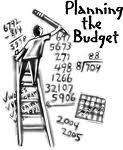
As a fee-only financial planner, lately some new clients have asked if I could use a different word besides budget when discussing their cash flow plan. Words do matter and for many reasons, the word budget congers up all sorts of negative thoughts and feelings. So for that reason and many others, lose the word budget and replace it with two words - spending plan.
Before you decide on a spending plan, keep one major goal in mind - your savings plan. Paying yourself first, meaning, putting your savings and investments to work by automatically funding these accounts first before paying your bills is the key to long-term financial success.
Of course, most people know this is the smart way to go and there was even a book written about it called The Automatic Millionaire, by David Bach. If you need a refresher course on how best to make savings and investing automatic, or you need to see why this simple yet powerful strategy is as effective today as when David first wrote about it, do yourself a favor and read or re-read this classic.
Finally, the reason so many people have trouble with spending plans is the monitoring required. Coming up with a spending plan is the easy part, monitoring your spending and making changes when necessary, that’s the hard part.
So why not make it easy on yourself. Instead of driving yourself or your spouse or partner crazy, try a different approach. Look at your savings goal for 2010. We have a little over 6 months left in the year. Take your annual goal, divide it by 12 and make sure the first bill you pay each month is an automatic transfer or withdrawal from your paycheck or money market account to your savings/investment accounts.
Next, with the remaining money, take out the amount that goes to all your fixed expenses, such as rent, mortgage, loan repayments, etc. What’s left is money to be spent on variable expenses such as travel, entertainment, etc. Come up with a list of all the things you like to spend money on each month; then prioritize that list from 1-10 or more if needed.
The main point I’m making is this. If you fund your savings at the first of the month, live within your means the rest of the month, meaning not spending more than you earn that month, prioritize how best to spend the discretionary money you have available each month, you’re on the road to success and the 'B' word gets removed from your vocabulary.

